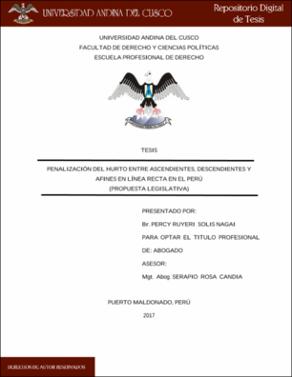| dc.contributor.advisor | Rosa Candia, Serapio | |
| dc.contributor.author | Solis Nagai, Percy Ruyeri | |
| dc.date.accessioned | 2018-10-15T21:32:06Z | |
| dc.date.available | 2018-10-15T21:32:06Z | |
| dc.date.issued | 2017-12-19 | |
| dc.identifier.uri | https://hdl.handle.net/20.500.12557/1923 | |
| dc.description.abstract | El presente trabajo de investigación tiene sus motivaciones en los hechos ilícitos que se vienen suscitando con mucha frecuencia en nuestro país, investigación que contiene antecedentes nacionales, mas no en el mismo sentido que la presente investigación, es decir no conllevan los límites abarcados en la presente tesis donde se desarrollará los parámetros, características, requisitos que son necesarios para penalizar el delito de hurto entre ascendientes, descendientes y afines en línea recta. Es por ello que se tiene en cuenta en los problemas principales y secundarios los requisitos propios del delito de hurto en nuestra legislación, así como dentro de nuestros objetivos esta determinar que efectivamente existe razones de índole jurídicos así como sociales para sancionar penalmente el ilícito mencionado. Que los ilícitos de hurto cometidos en nuestro país cada vez viene en aumento, de los cuales cada vez las personas están siendo más propensas ser víctimas de este ilícito, siendo ello preocupante porque en varias ocasiones son sus propios parientes quienes cometen este delito en su contra, y amparando estos en el artículo 208 del Código Penal (excusa absolutoria), tema que es
abarcado completamente en esta oportunidad, ya que nos conlleva a conocer a fondo todo lo relacionado a este artículo de nuestra normativa penal, el mismo que exime de
toda responsabilidad los hechos ilícitos contra el patrimonio en agravio de sus familiares. La excusa absolutoria estará siendo desarrollada en toda su amplitud, ya que si bien el tema de investigación solo va en concordancia con el delito de hurto, desarrollaremos los demás incisos del propio artículo de la excusa absolutoria (artículo 208 C.P), es decir, quienes son los beneficiados con esta artículo, y en que ámbitos se presentan a parte de los ordinarios. Si bien la excusa absolutoria abarca cuatro ilícitos penales, analizaremos una parte de ello, tomando solo en cuenta para la presente tesis el delito de hurto entre ascendientes, descendiente y afines en línea recta en el Perú, tanto así que tocaremos temas como los delitos de hurtos prevenientes de la violencia familiar, aquel donde existe esta excepción a la regla. Contiene el presente trabajo de investigación el delito de hurto en nuestra legislación, así como los presupuestos de la excusa absolutoria, la reparación civil en los delitos de hurto relacionados con la excusa absolutoria. | es_PE |
| dc.description.abstract | The present research work has its motivations in the illegal acts that have been aroused with great frequency in our country, research that contains national antecedents, but not in the same sense as the present investigation, that is, they do not involve the limits encompassed in the present thesis where the parameters, characteristics, requirements that are necessary to penalize the crime of theft between ascendants, descendants and related in a straight line will be developed. That is why it is taken into account in the main and secondary problems the requirements of the crime of theft in our legislation, as well as within our objectives to determine that there are indeed legal and social reasons to criminally punish the aforementioned crime. That the crimes of theft committed in our country is increasing every time, of which every time people are being more likely to be victims of this crime, this is worrisome because on several occasions it is their own relatives who commit this crime against them , and protecting these in Article 208 of the Criminal Code (excuse for acquittal), a subject that is fully covered in this opportunity, as it leads us to know thoroughly everything related to this article of our criminal law, the same that exempts all responsibility for unlawful acts against the estate against their family members. The acquittal will be fully developed, because although the subject of investigation only goes in accordance with the crime of theft, we will develop the other paragraphs of the article of the acquittal (article 208 CP), that is, those They are the beneficiaries of this article, and in which areas are presented in addition to the ordinary ones. Although the excuse of absolution includes four criminal offenses, we will analyze a part of it, taking into account for this thesis the crime of theft between ascendants, descendants and allies in a straight line in Peru, so much so that we will address issues such as crimes of Preventive robberies of family violence, the one where there is this exception to the rule. It contains the present work of investigation the crime of theft in our legislation, as well as the presuppositions of the
absolutory excuse, the civil reparation in the crimes of theft related to the absolutory excuse. | en_US |
| dc.description.uri | Tesis | es_PE |
| dc.format | application/pdf | es_PE |
| dc.language.iso | spa | es_PE |
| dc.publisher | Universidad Andina del Cusco | es_PE |
| dc.rights | info:eu-repo/semantics/restrictedAccess | es_PE |
| dc.source | Universidad Andina del Cusco | es_PE |
| dc.source | Repositorio Institucional - UAC | es_PE |
| dc.subject | Penalización del hurto | es_PE |
| dc.subject | Delito de hurto | es_PE |
| dc.subject | Excusa absolutoria | es_PE |
| dc.title | Penalización del hurto entre ascendientes, descendientes y afines en línea recta en el Perú (propuesta legislativa). | es_PE |
| dc.type | info:eu-repo/semantics/bachelorThesis | es_PE |
| thesis.degree.name | Abogado | es_PE |
| thesis.degree.grantor | Universidad Andina del Cusco. Facultad de Derecho y Ciencia Política | es_PE |
| thesis.degree.level | Titulo Profesional | es_PE |
| thesis.degree.discipline | Derecho | es_PE |

